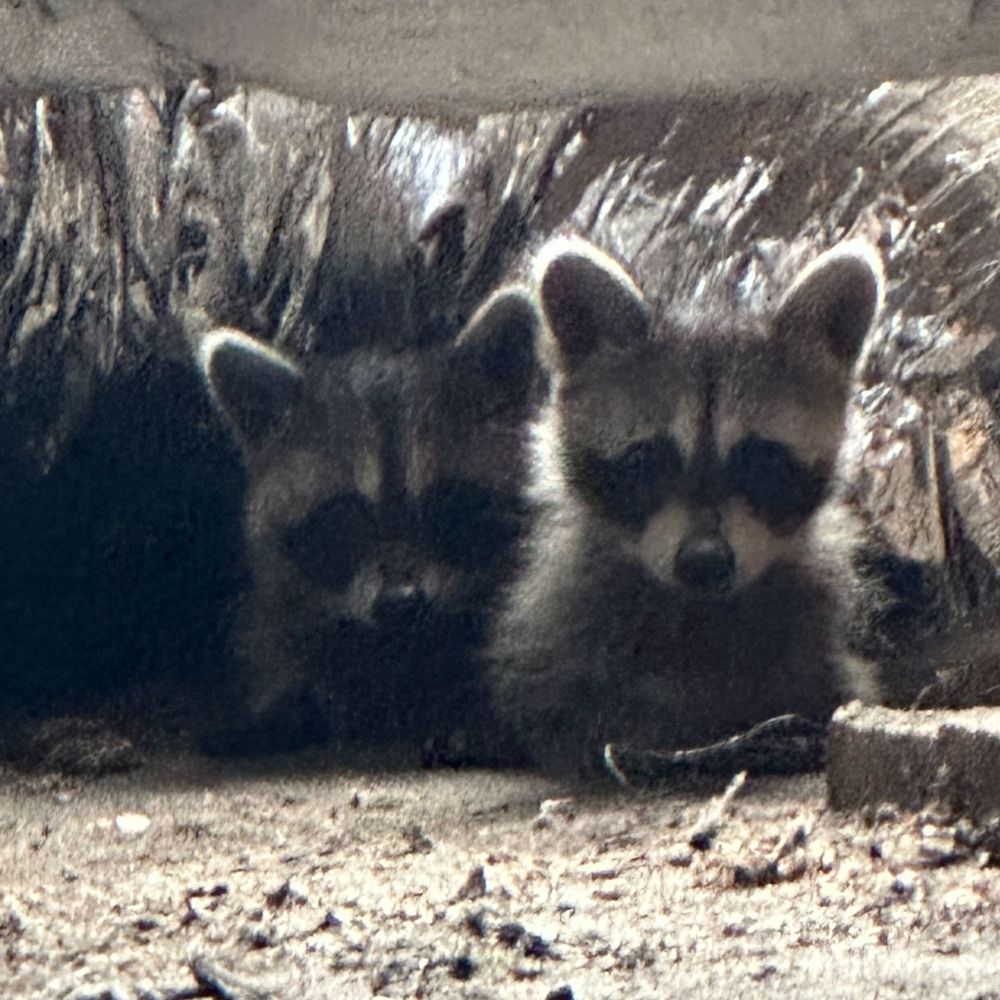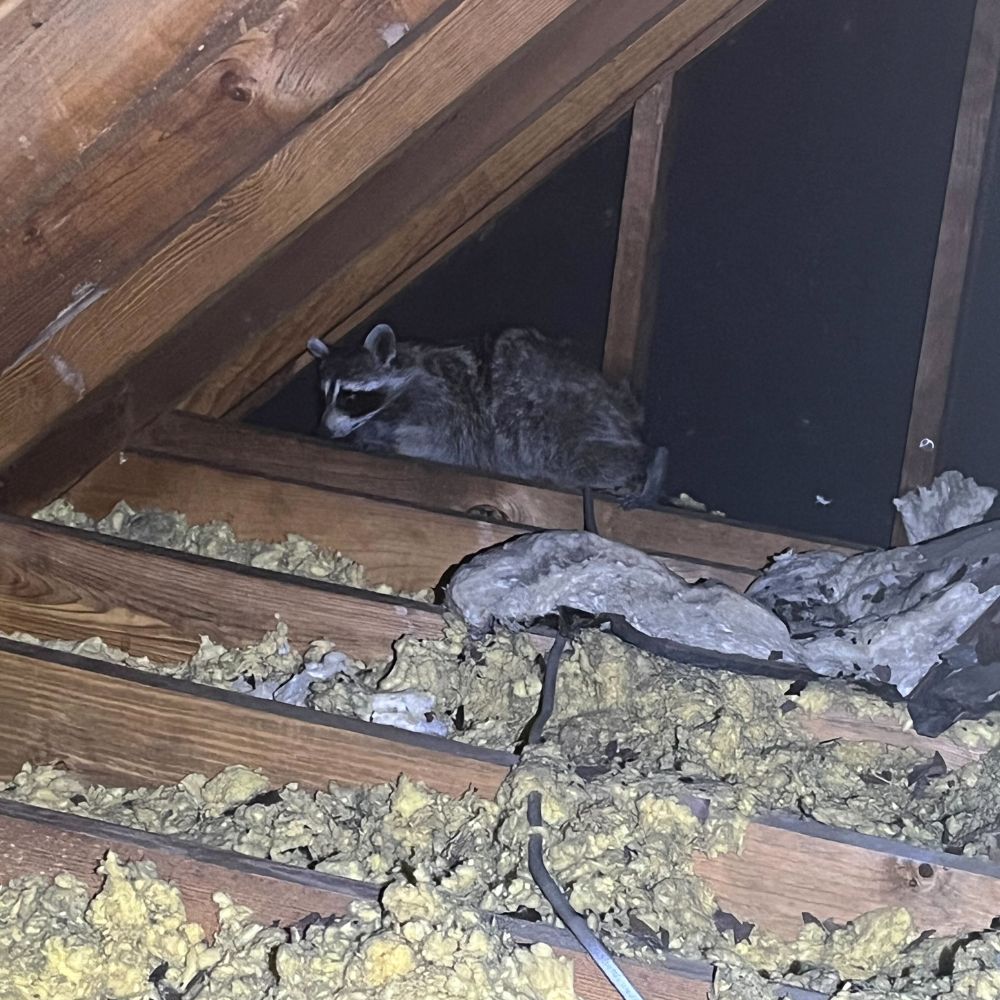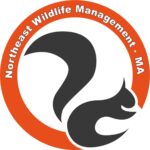raccoon Removal Service
Table of Contents
Raccoon Removal Service in Boston, MA
Do you need raccoon removal services in the Boston, MA area? Raccoons are large, furry animals that will knock over your trash cans, hang out in your garage, and break into your attic, where they will rip up your insulation, and soil it with urine and feces.
Raccoons carry rabies and other infectious diseases and may become aggressive when cornered or frightened.
Never attempt to remove a raccoon yourself, always leave it to the experts at North East Wildlife Management. Our team has years of experience dealing with nuisance wildlife in New England, so you can rest assured that we will solve your wildlife issue quickly and effectively. Contact North East Wildlife Management today to get started with a FREE estimate at 781-562-9659!

Signs of a Raccoon Issue
When dealing with a nuisance wildlife problem, identifying the culprit is crucial for effective trapping and removal. Some signs of a raccoon issue to look out for include:
- Loud stomping noises from the attic
- Scratching sounds, sounds of trash cans getting knocked over
- Vocal sounds like chittering and growling
- Foul, musky odor coming from inside walls, crawl space, or attic
- Urine and feces odor coming from attic
- Raccoon tracks around your garbage cans or attic floors: look out for tracks that contain five toes, with both hind and front sets of paws
Diseases Spread By Raccoons:
Raccoons can spread several diseases that are harmful to both people and pets, including:
- Rabies
- Raccoon Roundworm
- Canine Distemper
- Leptospirosis
- Salmonellosis
- E. coli
It’s important to seek professional help when dealing with raccoons to mitigate these health risks. Call us at (781) 562-9659 or submit a contact form for a free raccoon removal estimate.
Raccoon in Attic Removal
Attics provide the perfect place for raccoons to nest and have their babies, as they are safe, warm, and secluded, protected against predators and harsh weather. However, raccoons will cause extensive damage as they modify your home to fit their needs. Raccoons will find the smallest cracks and gaps in your roof, soffit, gable vents, rake boards, or eaves, and once they locate a potential entry point, they will use their claws and teeth to widen the opening until they can fit through. Once inside your attic, raccoons will rip up your insulation to make their nests, and they will also dig latrines in your insulation, soiling it with their droppings and urine. Raccoons often hide their babies inside your attic insulation, and if you attempt to remove the mother raccoon, you might not successfully find all the babies she hid. The mother raccoon will then do anything to get back inside, including ripping the shingles off your roof. Always leave raccoon removal to the professionals at North East Wildlife Management. Our team can trap and remove raccoons from your attic, taking special care to make sure that none are left behind in the process. Our team has been serving New England for over 7 years, so trust us to resolve your raccoon problem safely.
How To Get A Raccoon Out of Your Garage
Raccoons are also known to seek shelter in your garage, especially if your garage contains (or is close to) your outdoor garbage cans. If you have bowls of pet food in your garage, raccoons will show up to snack on that as well. Raccoons will raid your garbage cans for any food scraps left behind, and will often be spotted afterward inside your garage, feasting on what they find. Seeing a raccoon in the garage can be frightening and way too close for comfort for many people. Don’t worry, North East Wildlife Management is here to help. Our team can come out and remove the raccoon from your garage, and we can also set traps to catch any additional raccoons. Contact our team today to get started at 781-562-9659!
Raccoon Prevention
Raccoons, like all living things, are in search of three main things: food, water, and shelter. The best way to prevent raccoons from deciding that your home is the perfect place to nest is by limiting their access to these three things. Make sure standing water is eliminated on your property, and look for sources you might not consider, like your bird bath or a wheelbarrow. Keep all your garbage cans secured tightly, and only feed your pets inside. Putting your garage door down at night before dusk will keep the raccoons out.
Preventing raccoons from getting into your attic might be a little trickier, as you probably aren’t getting up on your roof and closely examining it for entry points every day. Thankfully, North East Wildlife Management can help. Our technicians can carefully examine your roof and attic for potential entry points for raccoons, and we will seal and fortify these cracks and gaps, preventing any raccoon infestations in the future.



Raccoon Removal Cost
The cost of raccoon trapping and removal is variable, based on several factors including the amount of raccoons that need to be removed, the location of the raccoons, and the specifications of the property.
That’s why North East Wildlife Management offers FREE estimates, so one of our technicians can come out, examine the property, and provide you with a specialized quote to fit your raccoon removal needs.
Best Raccoon Trapping and Removal Near Me
North East Wildlife Management offers the best raccoon trapping and removal service in Boston, MA, and the surrounding New England areas. Not only do we offer raccoon removal services, but we also offer seal outs and exclusions to prevent raccoons from getting inside in the first place. Not sure if your home is at risk for a raccoon infestation? Call us for a roof inspection!
Our team is armed with the training and experience necessary to safely and humanely resolve your raccoon issue. We can remove raccoons from both residential and commercial properties. We offer FREE estimates, so call us today to get started at 781-562-9659!
Frequently Asked Questions
Raccoons will not attack a human unprompted, however, they will defend themselves with their sharp teeth and powerful claws when they feel threatened or cornered. Raccoons will also attack if you are threatening their babies or their food. Raccoons can spread the rabies virus to people and pets, so treat any raccoon bites or scratches as a potential rabies exposure. Raccoons can also spread illnesses like raccoon roundworm and canine distemper, so a wild raccoon on your property should be removed as soon as possible.
If a raccoon is injured, sick, or poses an active threat to public safety, then animal control will come remove it. For example, if a raccoon is acting aggressively or showing signs of rabies, local animal control may intervene. However, for typical nuisance situations, such as a raccoon living inside your attic or hanging out in your garage, animal control often does not handle these cases. In such instances, it’s best to contact a professional wildlife removal company like North East Wildlife Management.
Professional wildlife removal ensures that the raccoons are removed safely, without posing any danger to you or them. Raccoons are armed with sharp claws and teeth that they will use when they feel threatened, especially if they have babies with them. Raccoons also hide their young within your attic insulation, so if you and remove and exclude a mother raccoon without her babies, she will rip off your roof shingles to get back inside. Additionally, raccoons can spread rabies and a wide variety of other diseases like leptospirosis and raccoon roundworm.
- Humane Live-Trapping Removal Services
- Feces Clean Up and Sanitization
- Raccoon Damage Repairs
- Entry Point Repairs and Seal Outs
- Raccoon Exclusion
- Insulation Replacement
- Attic Disinfecting and Deodorizing
Contact us to get a free estimate in Boston and the surrounding areas.
Raccoons do NOT hibernate and remain active throughout the entire year. However, during some periods of extremely cold weather, raccoons might sleep in their dens for several days at a time, conserving their body heat. Winter can actually be a more active time for raccoons, as January through March is their mating season, following which they will be searching for places like your attic to settle down and have their babies.
